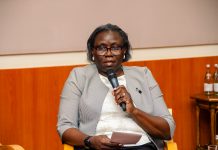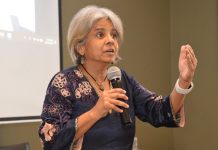By Thuku Kariuki
African Civil Society Organizations (CSOs) are keen to push for the continent’s priorities at the 30th United Nations Climate Change Conference of the Parties (COP30) in Brazil. Some have engaged conference participants ahead of time, urging them to address African priorities. They will continue such engagements throughout the event, which started 10th and runs through the 21st of November.
The CSOs concerned held a strategy meeting last month in Kenya’s capital, Nairobi. During the two days of discussions, they identified priorities, focused on action, and laid out a checklist of issues that African negotiators should raise their voices on. Besides engaging COP-30 participants, they also put out a closing document that clearly lays out their ideas on what to achieve and how to achieve it.
The document plainly summarizes their position on what commitments COP 30 should attain, saying: “As Africa’s civil society, we stand united in demanding that COP 30 deliver transformative, people-centered outcomes rooted in justice, equity, and human rights. Climate action must move beyond pledges to address the structural injustices that keep Africa vulnerable, ensuring finance is grant-based, adaptation and loss and damage are prioritized, and local communities are recognized as leaders in climate and biodiversity solutions.”
Reflecting some frustration with the lack of achievements in previous COP meetings, delegates insisted that this must be the moment Africa shifts from negotiating frameworks to delivering tangible results for its people.
They noted there is still an ever-expanding gap between climate finance commitments and delivery. There was also concern noted on the global shift from public to profit-driven private financial instruments. Profit is not always a good partner in humanitarian endeavors.
NOTING CHALLENGES THAT CAN’T BE CONQUERED ALONE
With limited fiscal space and mounting debt, many African nations face serious constraints in advancing climate action. On our continent, other areas need resources, including education, healthcare, job creation and infrastructure development.
The CSO leaders want developed nations to take responsibility for their outsized contribution to climate change. And to recognize that their ability to pay for some of the remedies can be achieved through tax fairness and regulations on polluting industries. This includes supporting the establishment of a UN Tax Convention that democratizes global tax governance, ensures multinational accountability, and empowers developing countries to reclaim resources lost through tax abuse and illicit financial flows. By the finish, they want COP 30 to provide new, robust post-2025 adaptation finance targets that address the growing adaptation needs.
Delegates complained that progress on phasing out fossil fuels since COP 28 has been slow, with many countries backtracking and reinvesting in fossil energy. They want COP-30 decisions must establish clear timelines and milestones for the phase-out of fossil fuels and the elimination of fossil fuel subsidies, with developed countries taking the lead and providing support to developing nations in their transition. The caucus also recognized that the global shift toward critical minerals presents new challenges for Africa, where the costs and social implications of the transition are poorly addressed.
The conference noted Africa’s importance to the rest of the world’s ecological futures. Africa’s natural ecosystems, from tropical forests and savannahs to wetlands and mangroves, are vital for global climate stability, biodiversity, and community livelihoods. Yet, they are under increasing threat from deforestation, land degradation, and unsustainable exploitation. Preserving and restoring these ecosystems is essential not only for mitigation and adaptation but also for advancing justice, food security, and resilience.
DEMANDING ACTION
The final declaration that closed the conference contained a number of demands. First and foremost, they declared that COP-30 must formally acknowledge that wealthy nations owe Africa a $36 trillion ecological debt.
Next on the priority list is actually providing promised funding. The Baku-Belém Roadmap must move beyond procedural outcomes to deliver tangible, time-bound, and binding financial commitments consistent with Article 9.1 of the Paris Agreement, the civil society leaders agreed.
Specifically, they demanded that climate finance be clearly defined, transparently structured, and anchored in climate justice principles, to ensure it supports, rather than undermines, debt sustainability. The activists added that it must also be flexible and predominantly grant-based to support National Adaptation Plans, community-led resilience initiatives, and Africa-based agricultural and food systems.
Another key point addressed at the summit was action on The Fund for Responding to Loss and Damage. They want African representatives to negotiate for rapid and efficient disbursement of monies, including direct cash transfers to affected populations, budgetary support to national and local governments, and swift emergency financing channels to enable immediate response and recovery following climate-related disasters.
IT’S NOT JUST ABOUT MONEY
The CSO leaders noted that it’s not just about throwing money at their challenges. Developed countries should also provide new, additional, adequate, and appropriate technology support to developing countries to enable economic diversification and an equitable energy transition, they declared.
The delegates also recognized the importance of community-based solutions in Africa. Their final document urges parties to guarantee community ownership and participation in all energy and food transition plans, ensuring that decisions are made with people, not for them.
Furthermore, the conferees demanded that the international gathering must adopt a concrete global framework to end deforestation, forest degradation, and ecosystem conversion while promoting equitable and sustainable land use. This is once again very much a community-focused issue.
Not unexpectedly, the activists demanded that COP-30 recognize the special roles and roadblocks faced by women, youth, the disabled and the elderly. Climate change does not affect specific groups equally and their rights and needs must be taken into consideration when developing policy and solutions.
Finally, the civil society leaders called for accountability. They want to require that all declarations and commitments made at the COP meetings are backed by independent audits, human rights criteria, and enforceable accountability mechanisms. COP outcomes must move beyond publicity and pledges to verifiable action that benefits communities and ecosystems, they averred.
Nairobi’s October CSO summit certainly provided official African COP30 delegates with a checklist of priorities they can work with during negotiations. All Africans can thank them and hope that their efforts lead to real action on addressing all of the negative repercussions, here on our continent, emanating from climate change.






